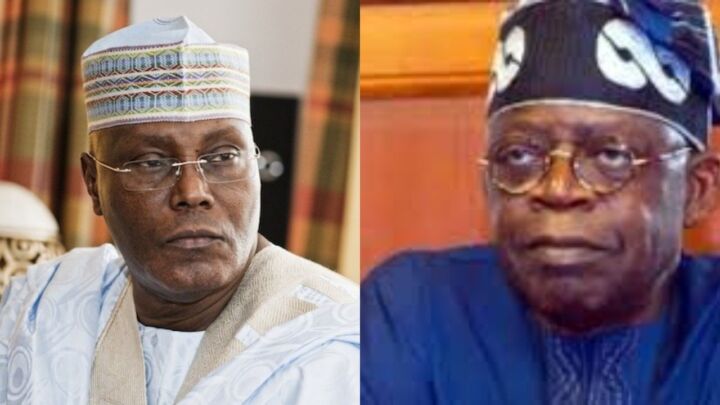Atiku Abubakar, presidential candidate for the Peoples Democratic Party (PDP), has responded to President Bola Ahmed Tinubu, saying that Tinubu cannot use privacy law as an excuse for blocking the publication of his academic records from Chicago State University (CSU).
In response to Tinubu’s objection to Magistrate Judge Jeffrey Gilbert’s ruling, Atiku argued that Tinubu’s objection lacked competence and substance.
The former Vice President claims that Justice Gilbert, after hearing from both sides, overruled all of Tinubu’s objections to the implementation of the valid order of the magistrate court.

Remember that on September 19 the court decided that Atiku’s request for discovery was more important than Tinubu’s request for privacy protection.
Tinubu had argued that Judge Gilbert erred in ordering the CSU to hand over documents related to Tinubu’s diploma certificate, transcripts, and admission letter, among other things, as reasons for denying Atiku’s request.
Tinubu won the presidential election in 2023, but Judge Gilbert said Atiku’s petition had validity since it raises questions about Tinubu’s eligibility to serve as president.
Dissatisfied, Tinubu asked the Federal High Court presided over by Judge Nancy Maldonado last Thursday to postpone the order’s enforcement until Monday, September 25.
Tinubu had argued, among other things, that the issuing of the order violates his right to privacy and breaches US law regulating the release of academic data at the proceedings on Monday.
The Federal Educational Records and Privacy Act, 28 U.S.C. 1232(g) (“FERPA”), protects student and school records from disclosure, and Tinubu contended that the discovery applicant’s request violates this law.
In his most recent effort, however, Atiku maintained that Tinubu’s use of the right of privacy to block the release of his academic records was without merit.
In response, Angela Liu, Atiku’s attorney, argued that the Family Educational Rights and Privacy Act (FERPA) and similar state laws do not establish an independent privilege for educational data and do not provide immunity from a subpoena issued by a court.
The applicant claims that “the assertion of a privilege or privacy interest under FERPA is a nonstarter; the statute does not give individuals any enforceable rights” and that “FERPA does not provide a privilege that prevents the disclosure of student records.”
Also, Atiku claimed that Tinubu has no right to invoke the privilege of judicial immunity because Atiku “has placed its educational records at issue, ECF 40 at 25-26 (explaining that Intervenor put his diploma at issue by submitting it to INEC and Tinubu’s records have already been introduced into the Nigerian proceedings, including by Tinubu himself, and widely published in the media).
Atiku argued that Judge Gilbert made the right call in granting the discovery, based on the balance of the Intel discretionary criteria, because Tinubu has already given his own educational credentials for consideration by courts and indeed by the public in numerous processes.
As the saying goes, “The Objections are meritless.”
Atiku appeared to defend the release of Tinubu’s controversial academic records by claiming that the Supreme Court of Nigeria has a system to admit new evidence.
According to Supreme Court Order 2, he must apply for leave on notice of motion before the date set down for the hearing of the appeal if he wants the court to receive the evidence of witnesses (whether they were or were not called at the trial) or to order the production of any document, exhibit, or other thing connected with the proceedings in accordance with the provisions of Section 33 of the Act.
“The fact upon which the party relies for making the application and the nature of the evidence or document concerned shall be set forth in an affidavit to be submitted with the application.
If permission is granted, the opposing party “shall be entitled to a reasonable opportunity to give his own evidence in reply, if he so wishes” but “it shall not be necessary for the other party to answer the additional evidence intended to be called.”
Atiku wrote, “Contrary to Intervenor’s overblown hyperbole, Applicant is not attempting “to undertake a fishing expedition into Intervenor’s private, personal, and protected school records.” He argued that his application is a straightforward Section 1782 application.
“Rather, Applicant seeks to test (1) the authenticity and origin of twelve (12) pages of documents (including two very different diplomas) purporting to have been issued by CSU (the “CSU documents”) —all of which have already been submitted to the Nigerian courts and widely published in the media; and (2) the basis for CSU’s categorical assertion that Tinubu received a B.S. degree in 1979, given discrepancies between information in the CSU documents and information in the C
There is no reason for Intervenor to oppose the limited discovery Applicant requests if, as he claims, he graduated from CSU in 1979 and the CSU documents are true copies provided by CSU.
In light of the foregoing, the Court should reject all of the Objections.
“If the Court overrules the Objections, Applicant respectfully requests that it enter an order requiring production of documents no later than October 2, 2023, and the deposition scheduled no later than October 3 to allow time for transcripts to be finalized, and the discovery obtained to be sent to Nigeria (which is six (6) hours ahead) by October 4 so that such evidence may, in turn, be filed with the Supreme Court by October 5, which is when Applicant’s Nigerian coun”
Support InfoStride News' Credible Journalism: Only credible journalism can guarantee a fair, accountable and transparent society, including democracy and government. It involves a lot of efforts and money. We need your support. Click here to Donate
